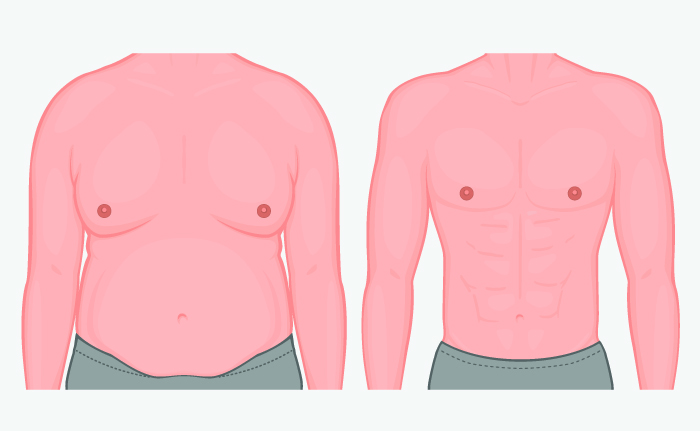Gynecomastia Treatment in Koramangala, Bangalore
Gynecomastia is a condition caused by hormonal imbalances in men. It is characterized by swollen and tender breast tissues. It often resolves within a few months.
For more information on the condition, speak to one of the best cosmetologists in Bangalore.
What do we need to know about gynecomastia?
Gynecomastia, commonly called enlarged breasts, is a condition characterized by an increase in breast tissue glands in men, leading to swollen and tender breasts. It often occurs due to an imbalance in the hormones. It is the result of either too much estrogen or too little testosterone in your body. While this isn't a serious condition that can affect you physically, you may feel embarrassed and may occasionally experience slight pain. Fortunately, it usually resolves on its own within a short period of time.

What are the symptoms of gynecomastia?
The signs and symptoms of gynecomastia are easily noticeable. They include:
- Breast enlargement due to swelling
- Pain and/or tenderness in your breast
- Nipple discharge
When do you need to contact a doctor?
If you experience pain or nipple discharge, you can seek professional help from the best cosmetologist hospital in Koramangala.
You can request an appointment at Apollo Spectra Hospitals, Koramangala, Bangalore.
Call 1860 500 2244 to book an appointment.
What are the causes of gynecomastia?
The causes of gynecomastia are:
- Hormonal effects: As an infant, you might have been born with enlarged breasts as a result of the effects of your mother’s estrogen. This is temporary and usually disappears within a few weeks. As a teenager, you might experience gynecomastia as a result of puberty. This also resolves within a couple of years. As an adult man, if you are above 50 years of age, you may experience gynecomastia.
- Medicines: Certain medicines such as antiandrogens, anabolic steroids, androgens, AIDS medication, antidepressants, antibiotics, cancer treatment drugs, etc.
- Drugs and alcohol: Alcohol and substance abuse may sometimes lead to enlarged breasts. Alcohol, marijuana and heroin are some examples of these substances.
- Other health conditions: Other health conditions may sometimes induce gynecomastia. Some of these are:
- Hypogonadism
- Tumors
- Hyperthyroidism
- Kidney and liver failure
- Liver cirrhosis
- Malnutrition
What are the risk factors of gynecomastia?
The risk factors of this condition are as follows:
- Puberty
- Age
- Use of performance drugs such as anabolic steroids and androgens.
- Other health conditions such as hormonally active tumors, thyroid disease, liver disease, etc.
How is gynecomastia diagnosed?
Gynecomastia is diagnosed by performing a breast exam, viewing your medical history and observing your symptoms. During the breast exam, the lump under your nipple (a firm, rubbery disk) is felt and examined. Your doctor will review your medical history to see if there are other conditions that are causing the symptoms of gynecomastia. Sometimes, you may have to take breast imaging tests like a mammogram or breast ultrasound. This test is usually performed to diagnose breast cancer. Once breast cancer is ruled out, your doctor will take a blood test to check your hormone levels.
What are the treatment options available for gynecomastia patients?
If your condition doesn't improve within the expected period of time, your doctor might recommend treatments to solve the condition. There are two methods of treatment. They are:
- Medication: Medications may help improve symptoms. Some of the medicines administered to gynecomastia patients are:
- Tamoxifen
- Aromatase Inhibitors
- Surgery: If medicines do not work effectively, your doctor might advise surgery. The two surgical procedures used to treat gynecomastia are as follows:
- Liposuction: In this procedure, the fat tissues in your breast will be removed surgically. However, the breast gland tissue remains intact.
- Mastectomy: In this procedure, the breast gland tissue is removed surgically. It is often done by making small incisions. The less the invasion of the procedure, the less the recovery time.
For more information, search for "gynecomastia surgery near me".
Conclusion
As gynecomastia is not a life-threatening condition and usually resolves on its own, you do not have to worry if you notice the symptoms. If you are too embarrassed and want to find a quick solution, you can consult the best cosmetologist doctor in Koramangala.
Other conditions that are commonly mistaken for gynecomastia are:
- Breast cancer
- Fatty breast tissue
- Breast abscess
The stages of gynecomastia are as follows:
- Stage 1: A small enlargement
- Stage 2a: A moderate enlargement and absence of skin excess
- Stage 2b: A moderate enlargement with a little skin excess
- Stage 3: A lot of swelling and excess skin
To hide your condition to a certain extent, you can wear dark and loose fabrics without patterns. Shirts with vertical stripes can help hide the enlarged tissues and enhance your masculine V silhouette.


.svg)
.svg)
.svg)
.svg)









